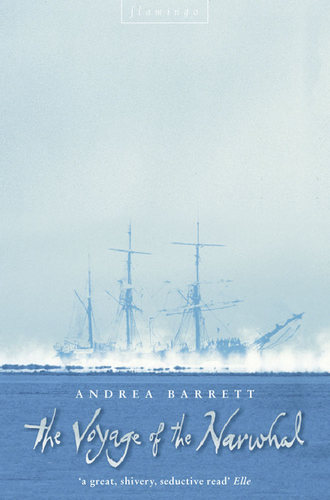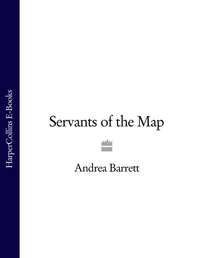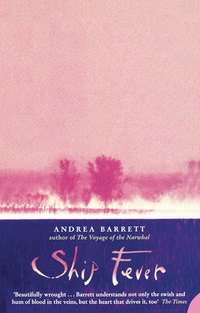
Полная версия
The Voyage of the Narwhal
“You know what we have to do,” Dr. Boerhaave said.
Zeke handed her to Robert Carey, who’d proved his skill with a gun by obtaining numerous birds on Beechey Island. Afterward Zeke wouldn’t look at Dr. Boerhaave and nothing Erasmus said could console him. Dr. Boerhaave retreated to a corner on deck, turning a skull around in his long fingers and staring at his notes as if he might bring the dogs back to life. Caught between the two men, Erasmus wondered what the dogs’ deaths meant.
Here they were, he thought, blocked from further sailing by ice, and blocked from overland travel by the lack of it. The snow on the land was mostly gone, except high on the hills and in hidden hollows; the land-fast ice was heaved and cracked and waterlogged. Even if they could cross Boothia, the strait between its far side and King William Land could no longer be frozen solid, but must be a mass of loose and shifting floes. Sledging was impossible; sledge travel was meant for spring, when the sun had returned but the ice was smooth and solid everywhere. Why, then, had they brought dogs and sledges in the first place?
But he knew the answer. Ever since they’d acquired the dogs, he’d worried that Zeke meant to overwinter somewhere if the brig failed to reach its destination. Some of the crew must have guessed this as well, but they’d all wanted to believe the dogs wouldn’t be needed. Then, after every stage of their desired route had been blocked, Ned had seized Erasmus’s arm and said, “Some of the men say we won’t go home this summer now. That we’ll stay all winter, in the ice—is it true?”
Erasmus hadn’t known what to say. He’d seen Zeke take out a new set of maps and scribble in his little black book; but now the dogs were gone. Once, but only once, Zeke leaned his head against the mast and said, “I wonder if someone poisoned them.”
“You know that’s not true,” Erasmus said gently. Everyone else pretended not to hear him.
Joe, perhaps wishing to deflect attention from the dead dogs and Zeke’s foul mood, told stories that caused a different kind of uneasiness. The West Greenlanders among whom he’d lived, he said, had wonderfully designed harpoons and winter houses made of stone and turf with seal-intestine windows and seal-blubber lamps. How warm those houses could be in winter! So warm, he said, packed with bodies and lamps, that the women wore only fox-skin knickers unless they had visitors.
A hush fell over the men. For a moment, in that silence, they visualized warm, curved flesh decorated with those flirtatious frills. In Melville Bay they’d traded tales of the women who’d taken up with members of both Parry’s and Franklin’s earlier expeditions, and Ivan Hruska and Robert Carey had talked about Esquimaux men who’d brought their wives aboard the visiting ships and offered them in trade for knives and wood. Perhaps they’d all hoped for a similar chance.
“Of course we forbade this kind of display among our converts,” Joe said. “No nakedness, we told them. And no exchanging wives.” Afterward Erasmus, who’d overheard part of his story and seen the men’s faces, spoke sharply to him.
EVERYONE WAS TIRED and hungry for fresh meat; with Zeke still sulking over the dogs, Erasmus took matters into his own hands and went ashore July 28 with Isaac Bond. The first caribou he’d ever seen bolted across the boggy ground, fleeing before the swarms of insects and then before Isaac, who shot four times and brought down two. They peeled the skins off carefully. In their hindquarters, Erasmus found freshly laid eggs of the warble fly and, in the hides, hundreds of holes where the larvae of a previous year’s infestation had eaten their way out. Isaac, wielding a long knife, regarded the skinned purple carcasses and said they weren’t so different from the deer he’d hunted as a boy. He cut off the heads, took out the tongues; peeled off the flesh, set the skulls aside.
Side by side they crowned a rock, antlers branching above white bone and lidless eyes. Erasmus, under their gaze, knelt and pointed out the joints most easily severed. Left went the knife, and right and left and down: intestines steaming, a large smooth liver, stomach pouring out masses of green paste. In another pile ribs and shoulders, haunches and loins and tongues. They wrapped the meat in the skins and Erasmus hefted his end of one bloody bundle and then froze at the sight of his own reflection in the eyes. The thread of their voyage had broken, he thought, the plot unraveled, the point disappeared; nothing was left but the texture of each moment and the feeling of his soul unfurling after years in a small dark box.
“Are you all right?” Isaac said. “Is this too heavy?”
The caribou were watching themselves being carried away. “Let’s try to drag the bundles,” Erasmus said. “Down to the boat.”
The odd humming feeling persisted in his head. And when he and Isaac climbed aboard the Narwhal and found Zeke standing on the quarterdeck with Joe, talking to three Esquimaux while the crew gawked from the bow, at first Erasmus thought he’d hallucinated them.
“They’re so short,” Isaac whispered.
He stepped back toward the railing, and Erasmus involuntarily squeezed the meat in his arms. What if these strangers were dangerous? Or if the crew members did something to anger them? Zeke and Joe had no weapons; Erasmus, leaving Isaac to deal with the bloody mass, hurried to Zeke’s side.
Joe and the Esquimaux spoke at some length. Then the Esquimaux stood quietly while Joe explained that these people, very different in dress and habits from those they’d met at Godhavn, wandered inland each summer in small family groups, searching for caribou. The camp of this particular group, Joe said, was several miles away, out of sight of the ship—they’d seen the hunting party, and had sent a delegation to investigate. “They invite our leaders to their camp,” Joe said. “Three of us, to go with the three of them.”
Zeke said, “You and me, of course.” He was silent for a minute. “And Captain Tyler,” he added.
Erasmus felt a little thrill at the idea that his figure, crouched near the skulls, had been the sight that drew the Esquimaux; then a fierce disappointment that he should not be included in the delegation. When he took Zeke’s arm and begged to come, Zeke shook him off and said he couldn’t ignore Captain Tyler’s rank.
The crew watched in silence as the six men dropped down the side of the brig, rowed to shore, and disappeared over a low hill. Three and three, dressed entirely differently, Zeke’s pale hair glowing behind the darker heads. The crew murmured behind them: suppose they’re murderers; suppose they’re cannibals; suppose they’re plotting to return with a great crowd and take over the ship—Fletcher Lamb with his bandaged hand, Barton DeSouza, Robert Carey.
Out loud, over the muttered comments, Dr. Boerhaave said, “What if they don’t come back?”
“There’s no point in even thinking like that,” Erasmus said. Although he was worried himself; if something happened to Zeke, how would he explain to Lavinia that he’d stayed safely on the brig?
“Shall we look at the bones from the mergansers?” Dr. Boerhaave said. “I finished the other set while you were hunting.”
From the sea he pulled a dripping sack. The water was boiling with Cancer nugax; he and Erasmus had learned to take advantage of the little shrimps’ hunger, hanging their roughly cleaned skeletons over the side in a fine-mesh net. Erasmus, still distracted, opened the sack to find that the voracious creatures had cleaned everything perfectly. The sight of the disarticulated bones calmed him a bit.
Dr. Boerhaave, making notes, said, “I’m ashamed to admit this, but—don’t you sometimes experience the search for Franklin’s remains as just…distraction? I wish our only task was simply to observe this amazing place and its creatures.” In the breeze his soft brown hair with its streaks of gray lifted from his forehead and fell and lifted again, like partridge feathers.
“But it’s not,” Erasmus said, clutching a fistful of wing bones. He looked down at the beautiful planes and knobs in his hands. Zeke would be fine, he had Joe to help him; the Esquimaux had seemed quite friendly. “But I know what you mean. Would you pass me that wire?”
When he looked up again it was early evening, and Zeke and Joe and Captain Tyler were hopping back onto the deck unharmed. Erasmus followed Zeke down into the empty cabin, a jawbone still in his hand.
“Tell me,” he said. “Tell me everything.”
“It went well,” Zeke said. “Joe didn’t have much trouble interpreting—he says the dialect is similar to that of the West Greenlanders. They liked our gifts.”
Up on deck, Captain Tyler began lashing down everything movable. “Esquimaux will steal anything,” Erasmus heard him tell the men. “Everything. And you can be sure they’ll be visiting now that they know we’re here.”
“But—what were they like?” Erasmus asked Zeke. “What were they wearing? What were they eating? What do their dwellings look like inside?”
“Interesting,” Zeke said. “Different. I was concentrating on the conversation with our host. Don’t you want to know if I heard any news of Franklin?” A huge smile split his face. “I’ve been waiting years for this,” he said. “Don’t you understand? Ever since I was a boy reading your father’s books.”
Suddenly he looked like that boy again, and Erasmus was reminded of something Lavinia had told him a few days after her birthday party. “How can I discourage him from this trip?” she’d said. “We fell in love talking about Franklin, you don’t know how many hours I’ve spent listening to his stories and plans. He cherishes that in me, he says he loves the way I listen.” Erasmus had asked her if she truly shared Zeke’s enthusiasm, and she’d sworn she did. Or at least one part of it: “I admire Franklin’s wife,” she’d said. “Her steadfastness.”
“I’m sorry,” Erasmus said, abashed. “Of course I want to know.”
“I asked the oldest man point-blank if he’d ever seen a ship frozen in the ice, or white men marching anywhere around here,” Zeke said. “He said no but I thought I saw him exchange a look with the man sitting next to him. They’ve asked us to return tomorrow. Will you come?”
OF COURSE ERASMUS went, as did Ned, Mr. Tagliabeau, Thomas Forbes, several other men, and Joe—still their only interpreter, despite all the evenings Zeke had spent with him, transcribing into his black book Joe’s version of the Esquimaux names for things. This time Captain Tyler, Mr. Francis, and a small detachment stayed behind to guard the ship. Dr. Boerhaave nearly stayed behind as well; Fletcher Lamb had returned to his hammock, complaining of shooting pains in his limbs and face, and Dr. Boerhaave was worried. But there was nothing he could do for Fletcher after giving him a few drops of laudanum, and so he joined the delegation.
They carried offerings of duff and dried apples, as well as knives and needles and files and beads to barter. Over the hills they went, into a rough and scrubby land bare of trees and veiled by a light drizzle. As they walked Erasmus listened to Joe, who was trying to teach Zeke some things about this group called the Netsilik. Now and then Erasmus bent to gather pebbles; he’d been lax, he felt, about examining the area’s geological structure.
“You might want to be a bit more…cautious,” Joe was saying to Zeke. “About asking directly for information; it’s not these people’s nature to respond to pointed questions, they dislike being cross-examined. And if I could let them know that we’ll barter for everything they tell us, that they’ll be rewarded?”
“Fine,” Zeke said impatiently. “Fine, fine, fine.”
Erasmus and the others could hardly keep up with him. In the treeless, featureless landscape, the six tents forming the camp stood out starkly. A bunch of dogs, tied away from the tents, howled like wolves.
“They’d eat the tents in an instant if they were free,” Joe said as they approached. All around, on the rough stony ground, were dog carcasses, bits of rotted meat and blubber, and broken bones. Thomas Forbes tripped over something and Dr. Boerhaave, bending down, said, “I believe that’s a human femur.” The bone was still shrouded in bits of leathery skin.
Thomas leaped backward, stumbling on the shallow pit in which the bone had been interred. The flat pieces of limestone meant to cover the body were small and quite light, Erasmus saw, and had clearly been pushed aside by a hungry fox or a dog. Thomas cursed and then bent over, very pale.
Joe said, “It’s not what you think. It’s not that they disrespect their dead: but they believe that a heavy weight placed upon the deceased’s body hinders the spirit from moving on. Of course the dogs uncover them, the dogs are always hungry.”
“Savages,” Thomas said. Later he would disappear for a day in the company of a young Netsilik woman, recently widowed, whatever discomfort he felt with the tribe’s habits apparently overcome. But now Erasmus saw Thomas look with dislike on the man who emerged from a strong-smelling tent to greet them. The stranger had a sparse moustache and a tuft of hair between his chin and his lower lip; the bottom of his nose was bent to one side, as if it had been broken but not set. When he spoke, Erasmus heard the word kabloona.
“White man,” Joe translated. In the light rain they stared at each other. The tent, Erasmus saw, was too small for them all to sit inside. They seated themselves on stones just in front of its opening.
Everything smelled of caribou. Behind him Erasmus could see how the rain saturated the hides, which hung heavily on the poles; how the rain dripped through the tiny holes drilled by warble flies when the animals had still been alive. Here too there were animal skulls, scores of skulls, jaws and eye sockets tilted among rocks and lichens. Zeke and the man who’d welcomed them—Oonali, he called himself—did all the talking, with Joe acting as interpreter. In return for the clasp knives and tobacco Zeke offered, and after Zeke had made it clear that he’d be honored to see Oonali’s hunting outfit, Oonali brought out a bow and some arrows that Zeke admired.
“I’d love to bring these home to the Toxophilites,” he said to Erasmus. “Wouldn’t that be something?”
Erasmus was scratching steadily in Lavinia’s journal—he couldn’t write fast enough, he couldn’t get down all the details. He sketched the bow: fir strengthened with bone and made more elastic by cunning springs of plaited sinew. He didn’t sketch the curiously twisted bowstring or the slate-headed arrows, as Zeke had by then arranged to trade a pair of axe heads for the entire outfit. Next to him Dr. Boerhaave scribbled similarly, while Ned, who’d stuck his head beneath the door flap, turned his head slowly from one view to the next. Whalebone vessels and walrus-tusk knives, spoons made from what looked to be hollowed-out bones.
Конец ознакомительного фрагмента.
Текст предоставлен ООО «ЛитРес».
Прочитайте эту книгу целиком, купив полную легальную версию на ЛитРес.
Безопасно оплатить книгу можно банковской картой Visa, MasterCard, Maestro, со счета мобильного телефона, с платежного терминала, в салоне МТС или Связной, через PayPal, WebMoney, Яндекс.Деньги, QIWI Кошелек, бонусными картами или другим удобным Вам способом.







